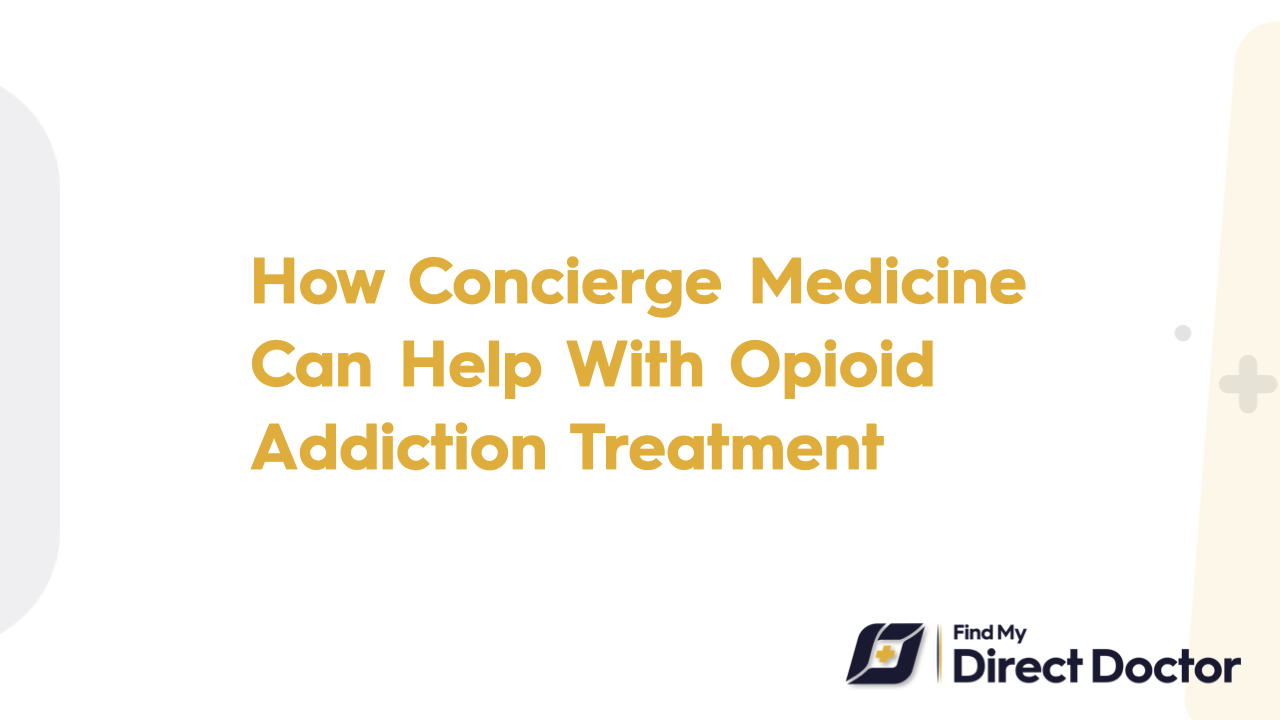



The treatment of opioid addiction requires a multifaceted approach because it is a complex and challenging condition. By providing comprehensive care that is tailored to each patient's individual needs, concierge medicine provides a unique and personalized approach to opioid addiction. A concierge medicine approach to addiction treatment is different from traditional addiction treatment programs that may involve multiple providers and fragmented care.

With concierge medicine, patients have a dedicated physician who oversees their entire treatment journey, from detoxification to ongoing recovery support. All aspects of care are coordinated through this continuity, and patients receive appropriate interventions when necessary. By establishing a one-on-one relationship with the concierge physician, patients' histories, triggers, and specific opioid addiction challenges can be better understood.
The accessibility of concierge medicine is another critical advantage in opioid addiction treatment. It is particularly valuable during times of crisis or in times when urgent support is required, as patients can communicate directly with their physician without the typical barriers found in traditional healthcare settings. It can make a significant difference in preventing relapses and maintaining sobriety to have a trusted healthcare professional available around the clock.
Patients undergoing opioid addiction treatment benefit from concierge medicine, particularly in terms of individualized care and enhanced support. In addition to individualized treatment plans, each patient's unique circumstances, including their physical health, mental health, and social environment, are taken into account. For opioid addiction to be effectively addressed, this tailored approach is crucial.
The concierge medicine model offers patients continuous access to their physician, which fosters a sense of security and trust, which is another significant benefit. It is a long-term process that requires sustained effort and guidance. As a result of this ongoing relationship, the physician can monitor progress, modify treatment plans as necessary, and motivate patients during challenging times.
The importance of holistic care is also stressed in concierge medicine. In addition to addressing the physical aspects of opioid addiction, concierge physicians usually incorporate mental health support, nutritional counseling, and lifestyle changes into the treatment plan. Through this comprehensive approach, patients are able to address the underlying causes of addiction and promote their overall health.
Many patients may feel uncomfortable or stigmatized when seeking treatment for opioid addiction in traditional settings due to the privacy and discretion offered by concierge medicine. In a concierge medical setting, patients can receive the care they need without fear of judgment or exposure, as the environment is more private and personalized.
In order to ensure the success of opioid addiction treatment, concierge medicine excels at providing personalized care during the preparation and recovery phases. An individual's medical history, addiction severity, and any co-occurring mental health conditions are thoroughly examined by the concierge physician before beginning treatment. The patient's specific needs and goals are addressed through a customized treatment plan.
In the preparation phase, concierge physician works closely with the patient to establish a strong foundation for recovery. Medically supervised detoxification may be required, as well as identification of relapse triggers and strategies for coping with cravings. As well as providing counseling and support as needed, the physician ensures that the patient is mentally and emotionally prepared for the challenges of addiction treatment.
As a patient recovers, concierge medicine provides continuous monitoring and follow-up care. By keeping in touch with the physician on a regular basis, any potential setbacks or obstacles can be identified early on, allowing for timely interventions. This proactive approach helps prevent relapses and supports the patient's long-term recovery.
Additionally, concierge medicine provides access to a network of specialists and resources that can help with recovery. Referrals may include mental health professionals, support groups, and rehabilitation programs that are tailored to meet the patient's needs. By coordinating all aspects of care, the concierge physician makes sure the patient receives comprehensive support throughout their recovery process.
An opioid addiction treatment program offered by concierge medicine is highly personalized and comprehensive, offering patients the individualized care and support they need to overcome addiction and achieve lasting recovery. Concierge medicine ensures that every patient receives the highest level of care and attention from the beginning of treatment to ongoing recovery support. Concierge medicine helps individuals reclaim their lives and move forward with confidence by addressing the unique needs and challenges of each patient.